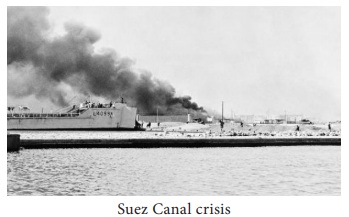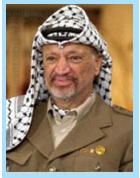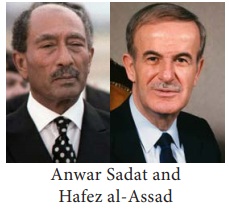The World after World War II - Arab-Israeli War | 10th Social Science : History : Chapter 4 : The World after World War II
Chapter: 10th Social Science : History : Chapter 4 : The World after World War II
Arab-Israeli War
Arab-Israeli War
The
Treaty of Versailles (1919) had provided for mandates in Turkish Arab Empire.
France was given the mandate for Syria and Lebanon, and Britain for Iraq,
Palestine and Jordan. This arrangement upset the Arabs since they had expected
independence at the end of World War I. Britain’s promise to Zionist leaders
that it would allocate one of the Arab lands, Palestine, to Jewish settlers
from Europe further embittered the Arabs. There was growing Arab antagonism
towards Zionist settlers, as they bought land from rich Arabs and evicted the
local peasant families who had been cultivating it for centuries.
At the end of October 1945, the Jewish underground organizations like Irgun Zvai Leumi (Zionist Para-military Organization) and the Stern Gang (Zionist Terrorist Organization) began to launch terror attacks on a large scale. Railways, bridges, airfields and government offices were blown up. The British government, presented the dispute to the UN for a decision.
Succumbing
to the pressure of great powers, the UN resolved to partition the British
mandate of Palestine into a Jewish state and an Arab state (29 November 1947).
Clashes broke out almost immediately between Jews and Arabs in Palestine.
Zionist Movement: In Palestine, the ancient
home of Jews, only a few thousand Jews were living in 1900. Some 15 million
were scattered around Europe and North America. (This is referred to as the
Diaspora.) In 1896 Thodore Herzel, a Viennese journalist, published a pamphlet
called The Jewish State in which he
called for the creation of a Jewish national home. Next year (1897) the World
Zionist Organisation was founded.
The
Israelis, won control of the main road to Jerusalem and successfully repulsed
repeated Arab attacks. As a result of separate armistice agreements (1947
Feb-June) between Israel and each of the Arab states, a temporary frontier was
fixed between Israel and its neighbours. In Israel, the war is remembered as
its War of Independence. In the Arab world, it is treated as the Nakbah
(“Catastrophe”) as a large number of Arabs became refugees. Israel was admitted
into the UN immediately much against the wishes of Arabs.
Suez Canal Crisis (1956)
In Egypt,
in a coup in 1952, Colonel Nasser became its President. In 1956 he nationalized
the Suez Canal, which undermined British interests. With the failure of
diplomacy, Britain and France decided to use force. Israel saw this as an
opportunity to open the Gulf of Aqaba to Israeli shipping and put a stop to
Egyptian border raids. On 29 October Israeli forces invaded Egypt. Britain used
this opportunity to demand that its troops be allowed to occupy the canal zone
to protect the canal. Egypt refused and on 31 October Britain and France bombed
Egyptian airfields and other installations as well as the Suez Canal area.
However, under pressure of world opinion, Britain and France ended hostilities
on 6 November. India represented by Nehru played a crucial role in resolving
the crisis.

Arab–Israeli War 1967
Ever
since the formation of the Palestinian Liberation Organization (PLO), Israel
came to be attacked frequently by Palestinian guerrilla groups based in Syria,
Lebanon and Jordan. Israeli resorted to violent reprisals. In November 1966 an
Israeli strike on the village of Al-Samū in the Jordanian West Bank, left 18
dead and 54 wounded. Israel’s air battle with Syria in April 1967 ended in the
shooting down six Syrian MiG fighter jets. In his bid to demonstrate Egypt’s
support for Syria Nasser mobilized Egyptian forces in the Sinai, seeking the
removal of UN emergency forces stationed there on May 18. On May 22 he closed
the Gulf of Aqaba to Israeli shipping. King Hussein of Jordan signed a mutual
defence pact with Egypt. Accordingly, it was decided to place Jordanian forces
under Egyptian command. Soon, Iraq too joined the alliance.
Palestine
Liberation Organization (PLO)-It is an umbrella
political organization representing the world’s Palestinians – all Arabs and
their descendants who lived in mandated Palestine before the creation of the
State of Israel in 1948. It was formed in 1964 to federate various Palestinian
groups that previously had operated as clandestine resistance movements. Yasser
Arafat was its most prominent leader.
Israel’s Offensive
Following
the mobilization of Arab states by Nasser, on June 5, Israel staged a sudden
pre-emptive air strike that destroyed more than 90 percent of Egypt’s air force
on the tarmac. A similar air assault incapacitated the Syrian air force. Within
three days the Israelis had achieved an overwhelming victory on the ground,
capturing the Gaza Strip and all of the Sinai Peninsula up to the east bank of
the Suez Canal.
Yasser Arafat
(1924–2004)

In 1969, Yasser Arafat became chairman of the PLO’s executive
committee a position he held until his death in 2004. Yasser Arafat was
appointed commander- in-chief of the all Palestinian Arab guerilla forces in
September 1970. Wearing a disguised pistol and carrying an olive branch and
dressed in a military uniform, his appearance raised world awareness of the
Palestinian cause. Arafat was elected by the central council of the PLO as the
first president of the state of Palestine on April 2, 1989.
Arab–Israeli War 1973
Egypt and
Syria under Presidents Anwar Sadat and Hafez al-Assad respectively concluded a
secret agreement in January 1973 to bring their armies under one command. Sadat
offered the Israelis a peace deal, if they withdrew from Sinai. Israel rejected
the offer. Egypt and Syria launched a sudden and surprise attack on the Yom
Kippur religious holiday (6 October 1973). Though Israel suffered heavy
casualties it finally pushed back the Arab forces. Arabs gained nothing out of
this war too. By way of mediation the USsucceeded in asserting its hegemony
over the region and its oil.

Related Topics